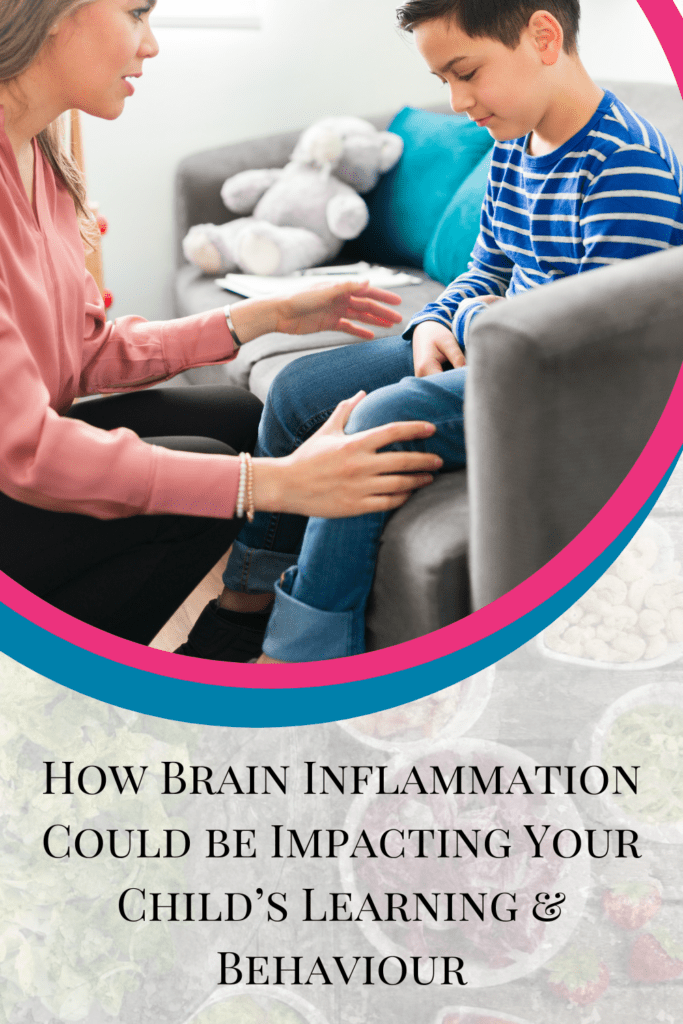Is your child’s brain on fire?
You’re probably thinking.
“Oh no. Nothing like that. They have learning difficulties. Dyslexia. ADHD. ASD.”
Yet inflammation is a major factor in most behaviour & learning issues.
Top Signs of Brain Inflammation:
- Poor memory
- Aggression
- Brain fog
- Poor coordination & balance
- Poor focus
- Tics/OCD
- Reading & writing issues
- Irritability
- Picky eating
- Sleep issues
- Bed wetting
- Hyperactivity
You might be thinking how can inflammation cause these issues?
The Glial Cells Build the Brain
As your child’s brain develops, glial cells which are found in the brain prune neuron activity and connections so they can migrate to optimal areas of the brain, branch out into new connections and remove unnecessary debris or matter.
This allows the brain to develop and function at its full potential.
But glial cells have another job.
They are also part of the brain’s immune system.
They can invoke a necessary inflammatory response if required.
Some inflammation is good.
It’s when it doesn’t go away that we have a problem.
When the Brain’s Immune System Goes Rogue
Glial cells can’t as easily be turned off as other immune cells in the body.
When there is a major trigger
OR
Several smaller triggers
Chronic inflammation results in damaged tissue.
In the case of glial cells – that’s brain tissue.
Think of them as going ‘rogue’ on the brain tissue.
This happens because there is an ongoing trigger to activate these glial cells which means they are NOT available to assist with optimizing brain development like pruning, optimizing neuronal connections or removing debris.
How Inflammation Affects Learning & Behaviour
Inflammation slows down communication between neurons.
When this happens, the brain’s functioning will slow down and this can cause a breakdown in various areas.
Inflammations show up differently for each child depending on their unique biochemical and genetic makeup
Since our daily environment is bombarded with stuff you didn’t have to deal with or in the same amount, your child is more vulnerable to cognitive and behaviour breakdown even if they have the same genetics.
Getting Off the Band-Aid Merry-Go-Round
- IEPs
- Learning strategies and tutoring
- Medication
- Parenting strategies and behaviour plans
- Endless supplements.
Identifying what’s causing the inflammation is key.
(Pssst. There’s usually more than one thing)
These are the top triggers for brain inflammation:
- Poor diet high in additives and preservatives
- Pesticides, GMOs
- Sugar
- Chemicals in the home and bathroom products
- Infections and pathogens like parasites, strep, mold, Lyme
- Lack of sleep
- Food sensitivities
- Brain injury/concussion
- Birth trauma
- Imbalanced gut bacteria
- EMFs
- Poor gut health,
- Stress/Trauma
- Prenatal auto-immunity
Inflammation Can Begin In Utero
Inflammation occurs when the body is trying to protect your child from a trigger they are exposed to.
Maternal inflammation and its triggers can influence genetic expression and be passed on, which is also why it is important to look at environmental factors when it appears that learning and behaviour issues ‘just run in the family’.
So where do you start?
- A low sugar, anti-inflammatory diet
- Support drainage and detoxification
- Addressing food sensitivities by healing the gut
- Lots of quality sleep
- Reduce exposure to EMFs and artificial light
- Address stealth infections & pathogens
- WATER
- Sunlight
Book a Clarity Call to learn more
